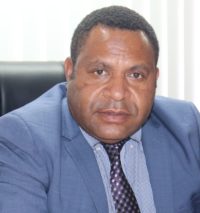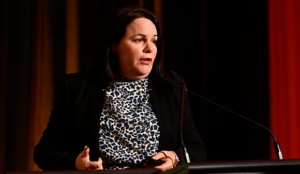Acting Managing Director Carolyn Blacklock has resigned from state-owned utility, PNG Power. The announcement comes with the state-owned utility on the cusp of launching a new ‘reform agenda’.
Blacklock’s resignation comes at a critical point in PNG Power’s development, with a ‘reform agenda’ for the state-owned utility due to be launched, the roll-out of connections under the donor-funded Rural Electrification Partnership under way, a review of the company’s finances expected to be finished in September, and the imminent connection of new gas-fired power in Port Moresby.
‘I have made a very hard but strategic decision to stand down in the hope it allows relations between PNG Power and our shareholder [the PNG Government] to normalise and thus allow the reform of our company to continue.’
Blacklock was appointed to the managing director position on an acting basis in January 2018—the first woman to perform the role—after a period as a special advisor to the PNG Government on infrastructure and development. She was previously the Resident Representative in Papua New Guinea for the International Finance Corporation.
She will be succeed at least temporarily by internal appointee Douglas Mageo, who will Acting Chief Executive Officer until a permanent replacement can be recruited.
Reasons
In a statement to the 2500 PNG Power staff, Blacklock explained why she had resigned.
‘I have made a very hard but strategic decision to stand down in the hope it allows relations between PNG Power and our shareholder [the PNG Government] to normalise and thus allow the reform of our company to continue.’
She cited non-payment of electricity bills by the government and issues related to two new gas-fired Independent Power Producers developed to service the Port Moresby power grid—Dirio Gas & Power (owned by the Mineral Resource Development Corporation) and NiuPower (owned by Oil Search and Kumul Petroleum)—as two factors in her resignation.
‘What concerns me most is that PNG Power under my leadership has been unable to achieve dispatching power from the commissioned, low cost, clean gas-fired NiuPower Power Station.
‘As a result, our costs have remained high and we are unable to sustain the double impact of continuing higher costs due to the failure to dispatch from NiuPower and Government not paying its way for electricity.’
‘We are one of the few power institutions in the world who managed to go from an almost green institution with about one in five Papua New Guineans connected to power, to now regressing to be primarily a fossil-fuelled utility and only about 13 per cent of our population having access to energy.’
NiuPower, whose Port Moresby power station has a generation capacity of up to 58 megawatts, signed a power purchase agreement with PNG Power on 26 April.
Business Advantage PNG understands Dirio Gas and Power, which aims to eventually run three 15 MW generators, has yet to finalise a power purchase agreement with PNG Power.
Pricing

The Institute of National Affairs’ Paul Barker
While acknowledging that it was desirable for landowner-owned businesses such as Dirio to get ‘spin-off business’, Paul Barker, Executive Director of the think tank Institute of National Affairs (INA) told Business Advantage PNG that there were concerns that the Dirio power plant would sell electricity to PNG Power ‘at a price above what a competitive price should be.’
He noted that PNG’s state-owned enterprises were often open to political interference but that ‘there are some pretty good staff at PNG Power. What they need is a bit of a level playing field for the good people to get on with their jobs.
‘That requires someone supported by both the board and the government to implement a sensible plan for long term planning and implementation, recovering debt, building up their balance sheet, and having funds for core activities including routine maintenance, as well as upgrades.’
‘When the INA does our regular surveys of business, electricity is always high up on the list of impediments—business wants reliable and affordable power,’ he said.
Vision
Only last week, Blacklock outlined her vision for PNG Power pursuing a ‘least-cost power development plan’ at the 2019 Business Advantage Papua New Guinea Investment Conference [play the video at the top of this page for her complete speech].
The plan includes refurbishing existing hydropower sites fallen into disrepair, adding gas-fired electricity to the Port Moresby grid and then building 10 new landowner-owned distributed hydropower stations across the Highlands.
‘We are one of the few power institutions in the world who managed to go from an almost green institution with about one in five Papua New Guineans connected to power, to now regressing to be primarily a fossil-fuelled utility and only about 13 per cent of our population having access to energy,’ she told delegates. ‘It’s a pretty incredible regression.’
‘It makes us the least affordable and least connected utility in the world, and that’s not a statistic that … we are going to be able to suffer. We really have to fix this company and fix this problem.’
Continuity?

PNG Power Chairman Peter Nupiri
Initial indications are that the company intends to continue to pursue the reform agenda stated by Blacklock.
‘I want to thank Carolyn for all her efforts in stabilising and initiating a Reform Agenda for PNG Power, underpinned by the Least Cost Power Development Plan,’ said PNG Power Chairman Peter Nupiri in a statement the day after her resignation.
‘Our path forward is clear. PNG Power needs to do a fuel switch from high cost imported HFO/Diesel to Gas in the Port Moresby Grid, rebuild the existing hydro power stations and related infrastructures, develop hybrid (solar, battery, diesel) for the off-grid centres and distributed smaller hydros in the long term.’









Speak Your Mind